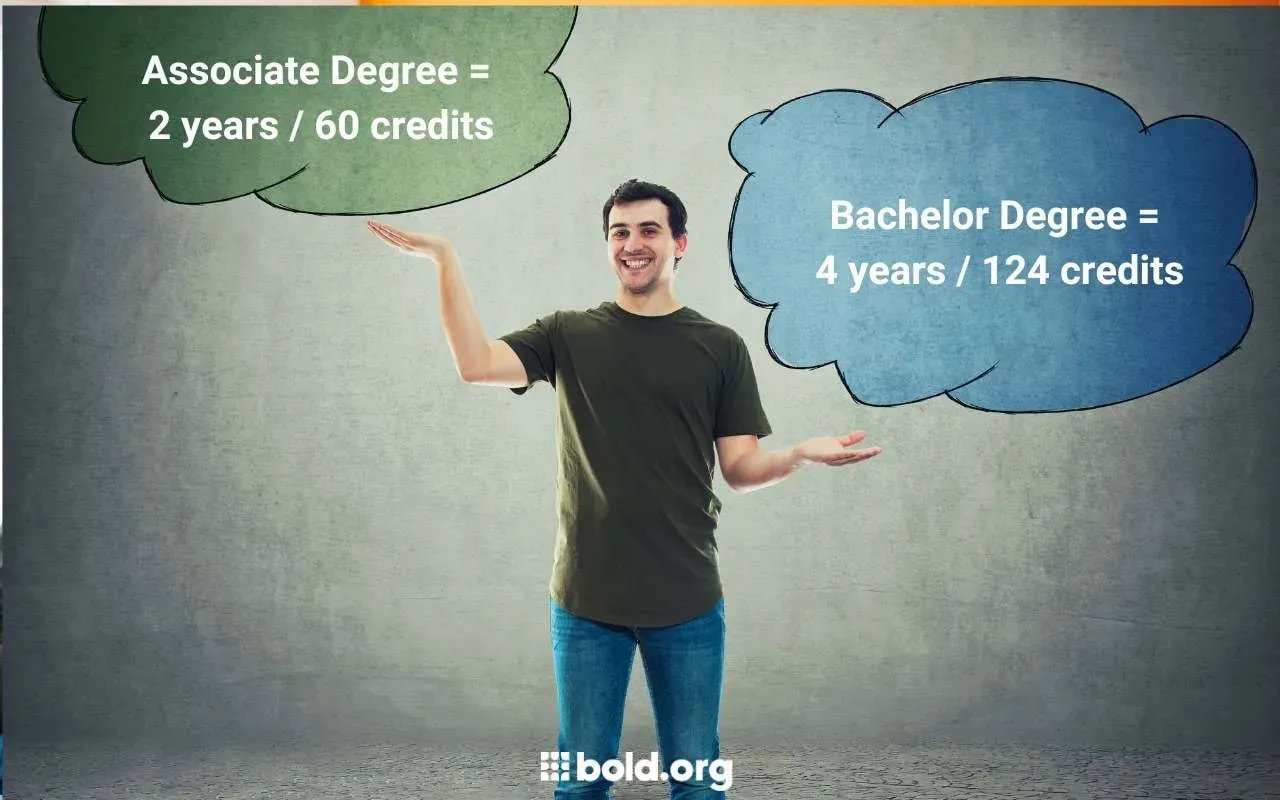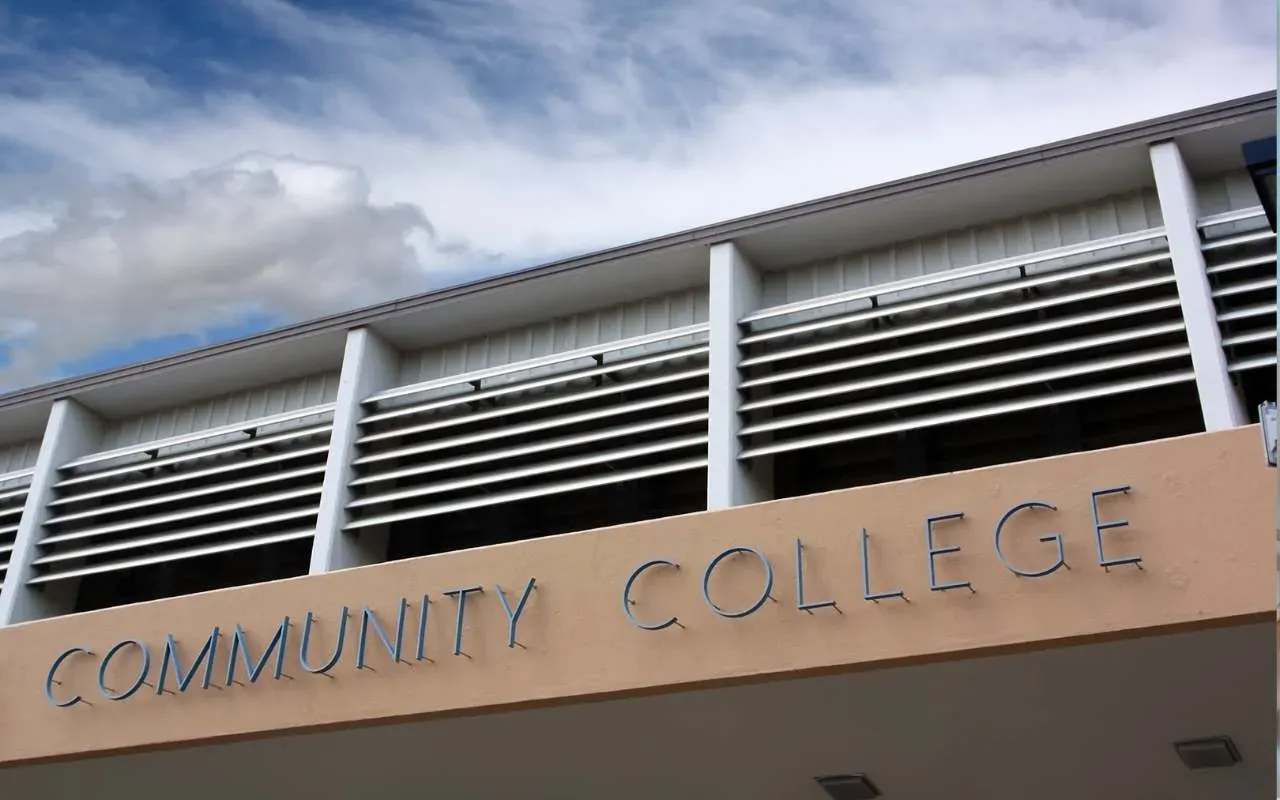How Many Credits Is an Associate Degree?


Embarking on getting a degree is a life-changing step. Although the time may vary depending on each student, earning an associate's degree usually requires 60 credits (about two years of full-time study). A significant insight into finishing your associates is the possibility of transferring to a four-year college to get a bachelor's degree.
This blog will cover college associate degree options, how the credit educational system works, the different ways to get your associate's degree, and the benefits of transferring.
Ready to start your academic journey? Get the financial help you need at Bold.org!
What Is an Associate Degree and How Does It Work?
An associate's degree is a two-year undergraduate program that provides foundational knowledge in various fields of study. Typically offered by community colleges, technical schools, and some universities, it serves as a stepping stone for higher education or immediate entry into the workforce.
Get Matched to Thousands of Scholarships
Create your Bold.org profile to access thousands of exclusive scholarships, available only on Bold.org.
Create Free ProfileWhat are Credit Hours & Degree Completion?
The first thing to understand is how the credit system works. Generally, one college credit means you go to class for one hour each week for a whole semester. The number of credits enrolled during a semester will determine whether a student is part-time or full-time, which affects the amount you can get from your financial aid award.
Credits determine your workload during the semester, affecting how much time and money you will need to pursue them. Each course you complete earns you a certain number of credits (usually 3), and most students enroll in 12 credits per semester to be considered full-time students.

How Many Credits Do You Need for an Associate Degree Program?
To earn an associate degree, you typically need to complete a minimum of 60 credit hours. This requirement is standard across various types of classes of associate degrees, whether it's an Associate of Arts (AA), Associate of Science (AS), or Associate of Applied Science (AAS).
Different Types of Associate Degrees
- Associate of Arts (AA): Focuses on liberal arts education and often includes courses in humanities, social sciences, and communication.
- Associate of Science (AS): Emphasizes science and math courses, preparing students for further study in scientific or technical fields.
- Associate of Applied Science (AAS): Geared towards immediate employment, featuring practical and technical skills relevant to specific careers.
Credit Requirements Based on Programs and Institutions
While 60 credits academic year is the baseline, some institutions may have variations depending on specific program requirements. For example:
- General Education Requirements: These courses cover essential academic skills such as writing, math, and critical thinking. They usually take up to 30 credits.
- Major-Specific Courses: The remaining credits are typically dedicated to courses within your chosen field of study or major.
- Electives: Some programs allow for elective courses that let you explore additional areas of interest.
At bold.org, you can find answers about your college journey and tips on financing your associate's and bachelor's degree programs.

Timeframe for Completing an Associate Degree
The typical timeframe to complete an associate degree is 2-3 years. This duration assumes a full-time course load. College courses are generally 12/15 credit hours per semester. Several factors can influence how long it takes to earn an associate degree:
- Part-Time vs. Full-Time Enrollment: Part-time students often take longer to finish due to a lighter course load.
- Program Structure: Some programs offer accelerated options, while others have more stringent prerequisites that need to be fulfilled sequentially.
- Transfer Credits: Students who transfer credits from previous coursework can sometimes shorten their completion time.
- Course Availability: Limited course offerings each term can delay your progress if required classes are not available.

Associate Degree: A Pathway to Bachelor's Degrees
A good strategy is when transfer students use their associate degrees to move forward with a bachelor's degree program.
The possibility of transferring to a four-year college to earn a bachelor's degree while pursuing an associate's degree is worth considering. If you plan well from the beginning, you could transfer up to 60 credits between academic years (half of the credits needed to become a graduate!). But first, knowing which credits will transfer is important so you can make the most of your education, save tons of money, and fulfill those mandatory courses before transferring to a bigger university.
Transferability of Credits to a Higher-Level Program
Many schools have agreements called articulation agreements that make it easier to transfer credits from community colleges to four-year universities. These agreements ensure that the courses you took for your associate degree in community college will count towards your bachelor's degree requirements.
- Articulation Agreements: Schools like Los Angeles Valley College have clear pathways that allow up to 70 transfer credits (even more than 60!) from an associate degree to join UCLA. This Los Angeles Community College makes it easier for you to transition smoothly into a bachelor's program without retaking similar courses.
- General Education Requirements: Usually, the credits you earned in general education subjects during your associate degree can be used to fulfill the general education requirements of a bachelor’s degree. For example, an Associate of Arts (AA) often covers foundational humanities and social sciences courses, which are required for many bachelor's programs.
- Program-Specific Transfers: Some specialized associate degrees, like the Associate of Applied Science (AAS), may have fewer options for transferring credits because they focus more on immediate career skills. However, many universities are starting to recognize these degrees and creating specific bachelor's programs that accept AAS credits.
Remember to talk to academic advisors at your current high school graduates and the schools you're interested in or considering transferring to. I did not do this while earning my associate degree, which made me graduate with an additional 30 credits that did not transfer to my bachelor's degree. This will add time and expenses to earning your degree!
The Importance of Fulfilling Credit Requirements
Meeting the credit requirements in your associate degree program is crucial for several reasons. First, failing to meet these milestones can significantly delay your graduation. This delay could mean additional semesters, translating to more tuition fees and potential loss of federal financial aid or scholarships.
Consequences of Failing to Meet Credit Milestones:
- Extended Timeframe: Not meeting credit requirements can extend your time in school beyond the standard 2-3 years. This can be particularly challenging for those balancing work, family, and education.
- Financial Implications: Missing credit milestones may lead to extra semesters, increasing the overall cost of your education. Financial aid and scholarships often have credit completion criteria, risking your eligibility if you fall behind.
- Academic Progress: Falling short on credits can hinder your academic progress. Many courses have prerequisites that require a minimum number of completed credits, delaying your ability to enroll in advanced classes.
- Transfer Complications: If you plan to transfer to a four-year institution, incomplete credits may complicate the process. Universities typically require a complete set of credits for smooth transfer and acceptance into higher-level programs.

Benefits and Opportunities with an Associate Degree
Earning an associate degree offers immediate benefits for career preparation. With a focus on practical skills and industry-specific knowledge, these associate degree programs are designed to make you job-ready upon graduation. Associate degree holders benefits include:
- Quicker Entry into the Workforce: Completing an associate degree generally takes 2-3 years, allowing you to start your career sooner than if you pursued a bachelor's degree.
- Cost-Effective Education: With lower tuition fees compared to four-year institutions, associate degrees offer a more affordable pathway to higher education.
- Specialized Training: Programs often focus on specific fields such as healthcare, information technology, or business, providing targeted skills that employers seek.
Potential Pathways for Furthering Your Education
In addition to transferring to a Four-Year Institution, there are other programs you may want to consider:
- Online Programs and Distance Education Courses: Flexible online options allow you to continue your education without disrupting your current job or personal commitments.
- Advanced Certifications and Specialized Training: Post-associate certifications and advanced training in specific areas can further enhance your career prospects and professional skills.

Exploring Online and Flexible Options for Associate Degree Seekers
The rise of online education has changed how you can pursue an Associate Degree. Offering unmatched flexibility, online certificate programs allow you to balance your studies with other commitments:
- Flexibility: Study from anywhere and at any time, eliminating the need for a rigid schedule.
- Cost-Efficiency: Often more affordable than traditional on-campus programs, saving on commuting and housing costs.
- Variety: Access to a diverse range of degree programs that might not be available locally.
- Speed: Accelerated courses enable you to complete credit hours faster, possibly shortening the overall duration of your degree.
Considerations for Choosing a Reputable Online Program
When selecting an online Associate Degree program, it's crucial to ensure that you choose a reputable institution. Here are some key considerations:
- Accreditation: Verify that the program is accredited by recognized accrediting bodies to ensure quality education and credit transferability.
- Transfer Policies: Check if credits earned can be transferred to other institutions or used towards a Bachelor's Degree in the future.
- Support Services: Look for programs that offer robust student support services such as academic advising, tech support, and career counseling.
- Faculty Credentials: Ensure instructors have relevant qualifications and experience in their field.
Frequently Asked Questions about How Many Credits Is an Associate Degree?
How are credit hours calculated, and what is the difference between part-time and full-time enrollment?
Credit hours are based on weekly class hours per semester. Full-time students take 12-15 credit hours per semester, while part-time students take fewer than 12.
How do articulation agreements work, and how can I ensure my credits transfer to a bachelor's program?
Articulation agreements ensure courses at a community college count toward a bachelor's degree at a four-year school. Consult with advisors to confirm transferability.
What are the benefits of pursuing an associate degree online, and how do I choose a reputable online program?
Online degrees offer flexible scheduling, lower costs, and various programs. Choose an accredited program with transferable credits, good support services, and qualified faculty.
Save time and start your college degree by applying for scholarships today. At Bold.org, we have thousands of easy applications ready for students like you!